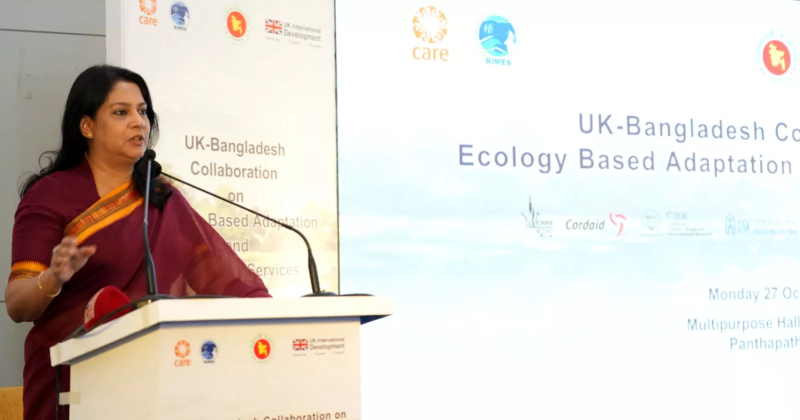- AI Moves Closer To Decoding Human Thoughts |
- UNESCO Calls Iran School Strike Grave Violation |
- Oil Jumps, Asian Stocks Slide On Gulf Tensions |
- Death toll from central Israel strike rises to 5 |
- DSE sinks 138 points on broad sell-off; CSE also tumbles |
UK-Bangladesh project to boost flood forecasting in 4 districts

UK-Bangladesh project to boost flood forecasting in 4 districts
Environment Adviser Syeda Rizwana Hasan has said that the EnRICH Project will strengthen flood forecasting and early warning systems in Sylhet, Sunamganj, Cumilla, and Feni between September 2025 and March 2026.
She made the remarks on Monday while addressing a national event titled “UK-Bangladesh Collaboration on Ecology-Based Adaptation and Hydro-Met Services” held at Pani Bhaban in Dhaka.
Appreciating the collaboration between the UK Met Office, RIMES, BWDB, and BMD, Rizwana said, “Our meteorologists often face challenges in accurately forecasting sudden floods or upstream water surges. Over the next six months, this partnership will enhance our analytical capacity to interpret rainfall and hydrological data more effectively.”
She added that the long-term sustainability of NGO-led projects depends on effective collaboration with government institutions.
Highlighting the importance of conserving Haor ecosystems, Rizwana said, “If the Haor ecosystem collapses, our food supply will decline. Protecting the Haor means protecting the country’s entire ecosystem.”
She noted that although the National Haor Master Plan has been finalised, the Haor Development Board still lacks an approved administrative structure, limiting its operational effectiveness.
Rizwana also informed that the government has drafted the Haor and Wetland Ordinance and prepared a protection order under the Water Act covering Hakaluki and Tanguar Haor. “Once gazetted, these areas will be managed as climate- and agriculture-friendly ecosystems,” she said.
“Haor is deeply connected to our food system — when water or electricity supply falters, food security suffers. It is our national duty to protect this ecosystem for the wellbeing of our people,” she added.
She also mentioned that Haor communities are deprived of basic services such as healthcare. “We are exploring a boat-based hospital model that can function both during floods and the dry season,” Rizwana said, suggesting that such a project could be implemented under the Climate Change Trust Fund.
Government officials, development partners, academics, and civil society representatives attended the event, which also showcased the achievements of the UK-funded NABAPALLAB Project in the Sundarbans Ecologically Critical Area (ECA).
The project’s expansion to Hakaluki Haor, one of South Asia’s largest wetlands, was also announced.
A panel discussion featuring experts from the ADB, CNRS, RSF, and the Bangladesh Forest Department stressed the need to integrate Nature-Based Solutions and Locally Led Adaptation into Bangladesh’s national climate strategies.

